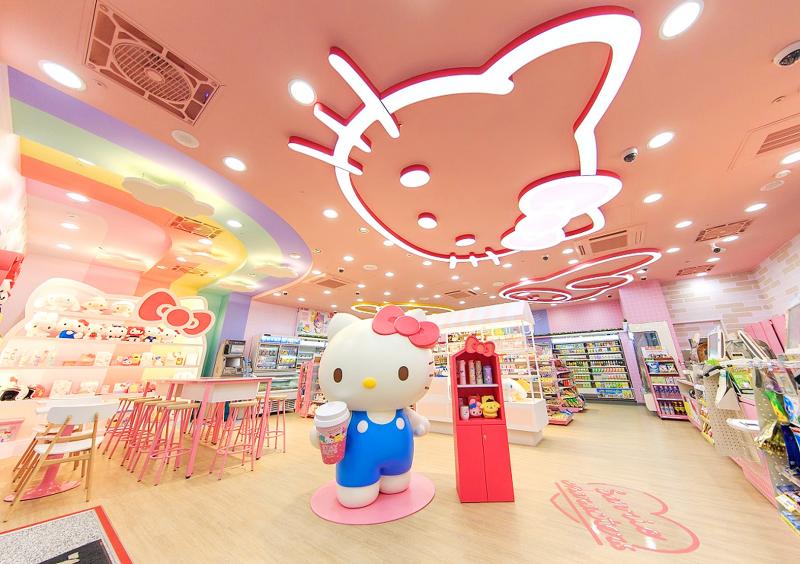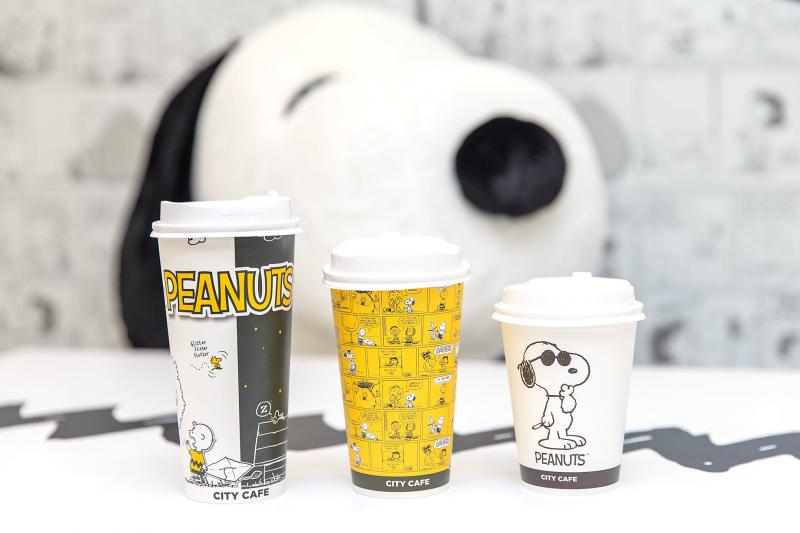As the summer vacation of elementary and high school students began last week, Taiwan’s leading convenience store chain 7-Eleven announced the opening of the world’s first Hello Kitty-themed store in downtown Taipei. Located in the city’s Ximending area, a popular spot among young people and foreign tourists, the pink store offers a variety of items from the cat’s creator Sanrio.
Due to high competition among the convenience store chains, 7-Eleven started to open themed stores last year in order to boost business. The 70 ping (231m2) Hello Kitty-themed store is the chain’s 10th and largest themed store. After the original stores were converted into themed stores, the number of customers for each store has increased by at least 20 to 30 percent.
Take the company’s Open Chan-themed store for example. The store has been attracting over 1,000 visitors per day after renovation. Last month, the company also caused a stir by opening the world’s first two Snoopy-themed 7-Eleven stores, both in Taipei.

Photo courtesy of 7-Eleven 照片︰7-Eleven提供
(Eddy Chang, Taipei Times)
隨著中小學上週起開始放暑徦,台灣便利商店龍頭7-Eleven宣布全球首間Hello Kitty主題聯名店在台北市開幕。這間粉紅色的主題店,位在年輕族群和外國遊客聚集的西門町商圈,販售這隻無嘴貓製造商三麗鷗旗下多種產品。
由於連鎖超商的競爭相當激烈,7-Eleven自去年起陸續推出主題店,試圖提振業績。Hello Kitty聯名店約七十坪(兩百三十一平方公尺),是目前第十家、也是最大一家聯名店。在原來的店面轉換成聯名店後,單店來客數至少成長兩到三成。

Photo courtesy of 7-Eleven 照片︰7-Eleven提供
若以該公司的Open將主題店為例,在改裝後平均每日可吸引上千位訪客。7-Eleven上個月在台北市,推出的全球首兩間史努比主題店亦引起騷動。
(台北時報張聖恩〉

If you think you’re cool and know all the latest trends, then here’s a question for you: What does the word “brat” mean? If you said something like, “a child who behaves badly or is annoying or rude,” you might not be as hip as you think. This four-letter word now has a new definition that has become quite popular. Its popularity caught the eye of Collins Dictionary, which crowned it as “Word of the Year 2024.” According to this new meaning of brat, it is used as an adjective to describe someone who has a confident, independent, and hedonistic

★ Bilingual Story is a fictionalized account. 雙語故事部分內容純屬虛構。 “Get in. It’s pouring.” She slid into the back seat, drenched and silent. “Tissues?” the driver asked. “No, thank you,” she said. Water beaded off her hair, ran from her coat, and made a small lake on the vinyl. She kept her head down, long black strands clinging to her face. “Where to?” She gave an address. “Funeral?” he asked as they slipped into the Xinhai Tunnel, rain fading to a hollow drum. She glanced up, puzzled. “No. Why?” “Crematorium’s about the only thing here.” He caught her eyes in the mirror.

Have you ever dreamed of hiking Taiwan’s majestic Mt. Jade or visiting Peru’s breathtaking Machu Picchu? These adventures sound amazing, but there’s something you should know about first: “altitude sickness.” This condition strikes when you climb to a higher elevation too quickly. The higher you go, the thinner the air becomes, making it harder for your body to absorb oxygen. The symptoms usually begin within hours of reaching high altitudes — about 2,500 meters or higher. You might experience headaches, dizziness, nausea, shortness of breath, or extreme fatigue. These symptoms can last for several days. The severity of altitude sickness varies

Continued from yesterday(延續自昨日) https://www.taipeitimes.com/News/lang Interestingly, one of the words Collins Dictionary discarded was selected by Oxford University Press (OUP) for its own Word of the Year. On its Web site, the publishing house of the University of Oxford stated it had conducted a public poll in which over 37,000 people participated. The voters, along with OUP’s language experts, settled on the term “brain rot.” One main reason for the decision was the vast amount of interest in the noun during 2023 and 2024, with its usage increasing by 230 percent. In fact, brain rot is not a new term by any